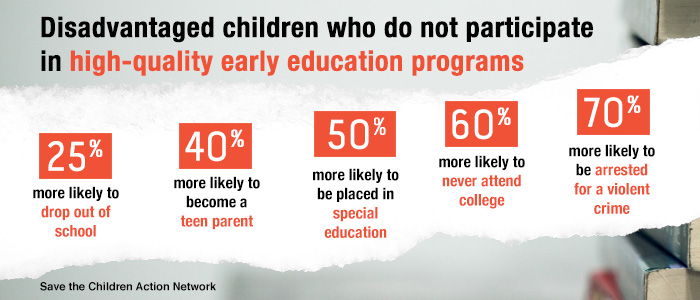Why It Matters

Research shows that high-quality early childhood education (ECE) and pre-K can improve school readiness and success for all children but particularly for children historically facing educational inequities.
Find out more about the benchmarks used to measure whether a state’s pre-K program is high quality.
Background
At the state and federal levels, current policy debates include whether to fund universal pre-K and how much to increase funding for programs for three- and four-year-olds.
The federal Preschool Development Grants Program, administered by the U.S. Department of Health and Human Services in consultation with the Department of Education, was funded at $250 million, despite the Trump Administration’s proposal to eliminate the program. The grant program has helped 18 states start or expand their state-funded pre-K programs to tens of thousands of four-year-olds from families with low-income families.
Though there are funding streams available from the federal government, increasingly, states and local governments are seeking out ways to fund programs themselves (e.g., dedicated tax streams or public/private collaborations).
Questions to Ask
What is the current availability of ECE programs in your community?
Does your district have universal pre-kindergarten?
Are there enough high-quality seats for every student?
Does pre-K include both three and four year olds?
Does the pre-kindergarten have a full-day option?
Who is attending pre-K programs?
What is the percentage of children from a variety of student groups—race, ethnicity, income level—are attending pre-kindergarten? Are there disparities? If so, what factors could be contributing to the differences?
What are the barriers to accessing pre-K programs?
Do students of color and those from low-income families have high-quality programs in close proximity to their homes?
What is the cost of early childhood education programs to families?
What scholarships or other subsidies are available to families to ensure affordability?
What kinds of transportation, if any, are provided for students? Are the pre-kindergarten program locations accessible by public transportation?
Is the program’s location accessible by public transportation?
Are free and reduced-priced breakfast and lunch options available?
What are the enrollment requirements for early childhood education programs?
How is the district or program proactively ensuring that all eligible families are aware of opportunities?
Is the information easily accessible to parents/caregivers?
In what form is the information distributed?
What is the application process?
Is information asked that could deter undocumented families from enrolling, or is it made clear that information is protected?
Do the programs support dual language learners?
How has the ECE workforce been trained to support the development of dual language learners?
What requirements are there for bilingual staff if a certain percentage of children speak the same non-English language?
Do lead teachers have to have a bilingual certification or license?
Are there culturally and linguistically appropriate educational materials utilized in the program?
How are families engaged in the student’s learning?
What kinds of family engagement does the program utilize? Are they effective?
Do programs offer parent education classes as part of its program?
Do the programs have sustainable and sufficient funding mechanisms?
What are the various funding streams for ECE?
Is funding integrated into the K–12 school financing system?
Does your state utilize federal Title I funds to create or expand equitable access to early childhood education?
Does your state plan utilize federal Title II funds to support effective instruction for early childhood education?
Related Issue Areas
Teacher compensation
Research shows that the gap in pay for early education teachers has an impact on a schools’ ability to attract and retain experienced, high quality staff, which in turn affects the quality of the programs.
Teacher preparation
Research shows that teacher effectiveness is among the most important factors impacting the quality of pre-K programs.
There is strong evidence that teachers’ training and possession of a bachelor’s degree matter in instruction.
Child care
Access to affordable, high-quality early child care is a critical support for parents/caregivers that can contribute to closing the achievement gap and producing other long-term benefits for children.
Wraparound services
Young children benefit most from an early childhood system that is built through collaboration and includes a comprehensive range of services and supports.
Learn More
NIEER State of Preschool Yearbook: A national annual report that tracks the funding, access, and policies of state-funded preschool programs in all 50 states
© 2025. Leadership for Educational Equity. All Rights Reserved.
